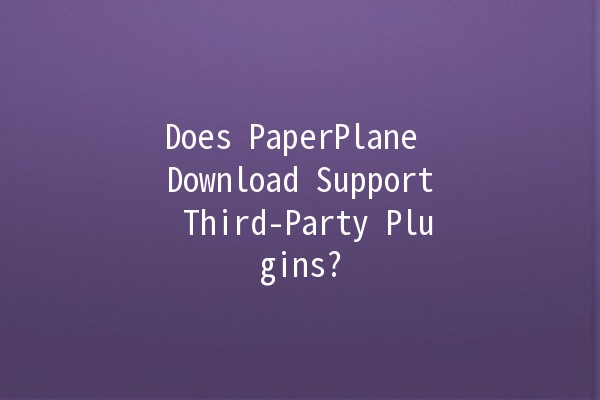In the rapidly evolving landscape of digital communication and collaboration tools, PaperPlane has emerged as a popular choice among users. With its intuitive interface and robust features, it has garnered attention for its capabilities. However, a common question that arises is whether PaperPlane supports thirdparty plugins. This article aims to provide a comprehensive understanding of this topic, detailing the aspects of PaperPlane that relate to thirdparty integrations, as well as offering practical advice and productivity tips to optimize your usage of this platform.
Understanding PaperPlane and Its Capabilities
What is PaperPlane?
PaperPlane is a crossplatform messaging application designed for seamless communication. Known for its sleek design and userfriendly interface, it caters to both individual users and teams looking for efficient ways to collaborate. The application features file sharing, interactive messaging, and organizational tools.

The Importance of ThirdParty Plugins
Thirdparty plugins are external applications or tools that can be integrated into a main software platform to extend its functionality. They often provide specialized features that may not be present in the original software. These integrations can significantly enhance user experience and productivity, which raises the question: does PaperPlane allow such customizations?
Current Support for ThirdParty Plugins
As of now, PaperPlane does not officially support thirdparty plugins. The application is designed as a closed ecosystem to ensure stability and security. Relying on thirdparty plugins could introduce vulnerabilities and instability, which is why the developers chose to maintain a controlled environment.
Despite this limitation, users can still improve their experience through various means. Here are some practical productivity tips to consider:
Productivity Tips for PaperPlane Users
PaperPlane offers a variety of builtin tools that can enhance your productivity without the need for external plugins. For instance:
Task Management: The task feature allows users to create, assign, and track tasks within chats. Utilize this feature to keep projects organized.
Example: During a team project, create tasks related to individual responsibilities for clarity and accountability.
With an extensive volume of messages and files exchanged over time, efficiently navigating through conversations becomes crucial.
Keyword Searches: Use specific keywords to quickly locate important messages or documents. Using filters can streamline this process further.
Example: If you're looking for a specific document shared in a past meeting, searching with the project name as the keyword can help locate it instantly.
Managing notifications is vital for maintaining focus while using PaperPlane.
Custom Alerts: Tailor your notification settings to determine which conversations or task alerts are most important to you.
Example: If you are working on a crucial project, ensure notifications are enabled for that specific channel while muting general chats.
PaperPlane's collaboration features can facilitate effective teamwork.
Shared Folders and Files: Use the shared folder options for easy access to resources needed by your team members.
Example: Create a shared folder for all projectrelated documents and templates to maintain a single source of truth.
Regularly reviewing and organizing conversations can aid in maintaining clarity over time.
Archiving Old Conversations: Regularly archive old chats that are no longer relevant to minimize clutter and help focus on ongoing projects.Telegram中文版.
Example: At the end of each project, archive communication related to that discussion to keep your workspace organized.
Alternatives to ThirdParty Plugins
While PaperPlane does not support thirdparty plugins, users can explore alternatives within the ecosystem for enhanced functionality:
Depending on your needs, consider alternative tools that may offer the functionality you desire when paired with PaperPlane. For example, project management tools like Trello or Asana can effectively complement your use of PaperPlane.
Stay updated with any builtin integrations that PaperPlane introduces in future updates. Developers often listen to user feedback and may consider popular feature requests, including integrations with commonly used applications.
Common Questions About PaperPlane and ThirdParty Plugins
Currently, there are no official announcements regarding the support of thirdparty plugins for PaperPlane. However, user feedback is vital for developers, and expressing your desire for this feature could play a role in future updates.
Yes, web applications can be utilized alongside PaperPlane. For example, you can have Google Docs open in a web browser for collaborative documentation while using PaperPlane for communication.
While direct integrations may not exist, you can manually share links or files from other project management tools within PaperPlane to maintain accessibility.
Consider reaching out to the PaperPlane support team or community forums to express your needs. They may offer alternatives or workarounds to help you achieve your goals.
PaperPlane prioritizes user data security by maintaining a closed ecosystem. The absence of thirdparty plugins minimizes risks associated with external vulnerabilities.
Absolutely! Most software developers appreciate user feedback. You can typically submit feature requests via their support channels or community forums.
Although PaperPlane does not support thirdparty plugins, its builtin features and capabilities can still provide immense value to users. By employing the tips detailed above, you can enhance your productivity and make the most out of your PaperPlane experience. Moreover, staying engaged with the PaperPlane community can ensure you're aware of any updates or changes that could further enrich your usage of the platform. By fostering a productive environment, users can achieve seamless communication and collaboration, maximizing their efficiency and effectiveness in any project undertaken.